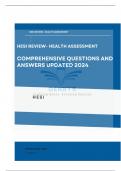2024 HESI Review - Health Assessment Exam 1 Latest Version Comprehensive Questions and Answers 100% Correct Answers Subjective data - Ans What the person says about himself or herself during history taking Objective data - Ans What the health professional observe by inspecting, percussing, palpating, and auscultating during the physical exam Purpose of the assessment - Ans Is to make a judgement or diagnosis Diagnostic reasoning - Ans Process of analyzing health data and drawing conclusions to identify diagnoses. Nursing process - Ans Assessment, diagnosis, planning, implementation, evaluation Assessment - Ans *Collect data -review of the clinical record -health history -physical examination -functional assessment -risk assessment -review of the literature *Use evidence -based assessment techniques *Document relevant data ABC's - Ans Airway, breathing, cardiac Complete database - Ans Complete health history and physical examination. It describes current and past health state and forms a bas eline against which all future changes can be measured. Yields first diagnoses Focused or problem -centered database - Ans For limited or short term problem. Collect "mini" database, smaller in scope, concerns mainly one problem, one cue complex, or one body system Follow up database - Ans Used in all settings to monitor progress on short -term or chronic health problems Emergency database - Ans Rapi d collection of the database, usually compiled concurrently with life -saving measures Holistic health - Ans Views the mind, body, and spirit as interdependent and functioning as a whole within the enviroment Culture is - Ans *Learned from birth through t he process of language acquisition and socialization *shared by all members of the same cultural group *adapted to specific conditions related to environmental and technical factors and to the availability of natural resources * dynamic and ever changing Cultural and Linguistic Competence - Ans A set of congruent behaviors, attitudes, and policies that come together in a system among professionals that enables work in cross -
cultural situations. Cultural Care Nursing - Ans Professional health care that is culturally sensitive, appropriate, and competent. Ethnicity - Ans A social group within the social system that claims to possess variable traits such as common geographical origin, migratory status, and religion. Ethnocentrism - Ans Tendency to view your own way of life as the most desirable, acceptable, or best and to act superior to another culture's lifestyle. Folk Healer - Ans Lay healer in the person's culture apart from the biomedical/ scientific healthcare system. Health/Illness - Ans The balance /imbalance of a person, both withing one's being (physical, mental, and or spiritual) and in the outside world, ( natural, communal, and/or metaphysical) Heritage Consistency - Ans The degree to which a person's lifestyle reflects his or her traditional h eritage, whether it is American Indian, European, Asian, African, or Hispanic. Religion - Ans The belief in a divine or superhuman power or powers to be obeyed and worshiped as the creator(s) and ruler(s) of the universe; and a system of beliefs, practices, and ethnic values. Socialization - Ans The process of being raised within a culture and aquiring the characteristics of that group. Title VI of the Civil Rights Act of 1964 - Ans A federal law that mandates that when people with limited Englis h proficiency (LEP) seek health care in health care settings such as hospitals, nursing homes, clinics, daycare, and mental health centers, service cannot be denied. Values - Ans A desirable or undesirable state of affairs and a universal feature of all cultures. What symptom is greatly influenced by a person's cultural heritage? - Ans Pain. Pain is a very private, subjective experience that is greatly influenced by cultural heritage. Expectations, manifestations, and management of pain are all embedded i n a cultural context. Which theory has been expanded in an attempt to study the degree to which a person's lifestyle reflects his or her traditional heritage? - Ans Heritage consistency Spirituality is defined as - Ans A personal effort to find meaning a nd purpose in life When considering cultural competence, there are discrete areas that the nurse must develop knowledge of to understand the health care needs of others. These discrete areas include understanding of - Ans A) the heritage of the health car e system. B) the heritage of the nursing profession. C) the heritage of the patient. D) his or her own heritage. E) cultural and ethnic values. While evaluating the health history, the nurse determines that the patient subscribes to the hot/cold theory of health. Which of the following will most likely describe this patient's view of wellness? - Ans The humors must be balanced.The hot/cold theory of health is based on humoral theory; the treatment of disease is based on the balance of the humors. Each cul ture has its own healers who usually - Ans Cost less than traditional or biomedical providers. What is the yin/yang theory of health? - Ans Health exists when all aspects of the person are in perfect balance. Before determining whether cultural practices are helpful, harmful, or neutral, nurses must first understand - Ans The logic of the traditional belief systems First level priority problems - Ans Those that are emergent, life threatening, and immediate(establishing and airway, breathing) Second level priority problems - Ans Those that are next in urgency requiring your prompt intervention to forestall further deterioration. (mental status change, acute pain, acute urinary elimination problem, untreated medical problems, abnormal lab test results Third level priority problems - Ans Those that are important to the patient's health but can be addressed after more urgent health problems are addressed. (Knowledge deficit, altered family processes, and low self esteem)




